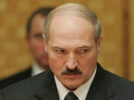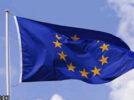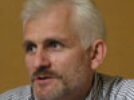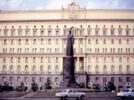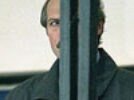Mr Lukashenko, “Europe’s last dictator”, has organized new elections which he promises will be “free and fair”.
‘Last dictator’ caught between east and west
Alexander Lukashenko, the president of Belarus, revels in his notoriety. Lucky are those, he says with a smile, who get to meet and sit down at a table with “the last dictator in Europe”. It is a sign of the 54-year-old Belarusan leader’s defiance of western political rules that he is ready to turn this epithet into a joke. It is also a measure of his confidence. After 14 years in power, he faces few internal challenges, in spite of a parliamentary election due at the end of the month.
Candidates for “members of parliament” brutally beaten up in Minsk
On September 16, on the Day of Solidarity, a rally dedicated to the anniversary of abduction of opposition leaders Viktar Hanchar and Anatol Krasouski was disbanded. Riot policemen have brutally beaten up the candidate for “parliament” “deputies”, including the leader of the United Democratic Party Anatol Lyabedzka, a deputy chairman of the Belarusian Popular Front Party Vintsuk Vyachorka and his son, a youth leader Franak Vyachorka and others. Riot policemen tore European and national flags.
EU makes re-engagement with Belarus conditional on parliamentary elections
The European Union will evaluate the situation in Belarus in the light of the nation’s September 28 parliamentary elections and of the progress made in embracing the values of democracy and human rights, said EU foreign ministers in conclusions on Belarus adopted at an External Relations Council meeting in Brussels on September 15.
Vondra: Czechs against immediate lifting of sanctions on Belarus
Brussels, Sept 15 (CTK) – The Czech Republic would not support an immediate lifting of the sanctions against Belarus that the EU imposed in the past, Czech Deputy Prime Minister for European Affairs Alexandr Vondra said in Brussels Monday.
There isn’t smell of liberalization in the air at all. Does Sikorski know about that?
A document has been received by the Human Rights Center “Viasna”, which confirms that on the eve and on the day of “elections” the regime is preparing repressive measures against the opposition.
David Miliband subjected to ‘F-word’ tirade from Russian foreign minister
David Miliband, the Foreign Secretary, was subjected to a tirade of four-letter abuse when he spoke to his Russian counterpart over the country’s invasion of Georgia.
The Rude Awakening
EU leaders believed Russia’s economic development would make it more European. Not anymore.
The 10 Big Myths of Russia, Its Leader, And Its New Power
Far from being a mystery and an enigma—to use Churchill’s language—today’s Russia now stands revealed as a bully, wrapped in nationalism and cloaked with its leader’s arrogance. Prime Minister Vladimir Putin’s adventure in Georgia has produced shock and awe at the sight of tanks, planes and warships mobilized against a small neighbor. But Russia has always been a great mythmaker—from setting up Potemkin villages in the 18th century to fomenting great fear that Sovietism would conquer the world after 1945. Here are 10 of the biggest myths about today’s Russia:
Why should oppositionists save regime of Lukashenka?
After democratic candidates withdraw from the “election”, the whole world will see political bankruptcy of the Belarusian dictatorship. Zmitser Bandarenka, coordinator of the Charter’97, one of the leaders of the “European Belarus” civil campaign, thinks so.


